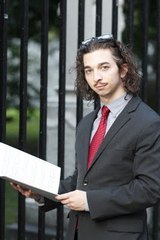|
Back
Tribute to a Young Talent New York
Spectrum, 121 Ludlow Street
05/22/2014 -
“Rewind and Fast-Forward with Michael Vincent Waller”:
Claude Debussy: Estampes: “La Soirée dans Grenade”
Arvo Pärt: Fratres
Morton Feldman: Four Instruments
Michael Vincent Waller: Per La Madre e La Nonna for String Trio – Variations for Quintet (World Premiere)
Erik Satie: Choses vues à droite et à gauche (Sans lunettes)
Kaija Saariaho: Mirrors
Anton Webern: Three Little Pieces for Cello and Piano
Yael Manor (Piano, Interlocutor), Itay Lantner (Flute), Jessica Park (Violin), Erin Wright (Viola), Clara Kennedy (Cello)

Y. Manor (© www.yaelmanor.com)
On a 200-year-old stretch of Lower East Side New York, once housing Jewish immigrant markets, to which Suzanne Vega sung a tribute and young New Yorkers gather each night like malarial mosquitos on Sumatra, up two flights from a barely signposted door, some remarkable concerts can be heard.
The Ludlow Street destination between a Thai restaurant and a burger joint is for Spectrum, a room housing the most eclectic selection of books, old and new guitars, a collegial audience and, last night, a concert honoring the young composer Michael Vincent Waller.
Mr. Waller had been performed here before, and while I found his work a bit dry, rather self-conscious (even a little pedantic), a visit to Ludlow Street is always a good event, so I was ready to hear more.
The “more” was directed by Israeli-American pianist Yael Manor, who had arranged a packet of other composers who might complement Mr. Waller’s own two work. That music was eclectic, to say the least, and Ms. Manor’s introduction to their music emphasizing the spatial aspect was a clever one. Though, truth be told, it didn’t really affect the emotions of Mr. Waller’s own music.
Ms. Manor herself led off with Debussy’s nighttime homage to Grenada, though in such a small room, not even the Steinway could quite reflect the echoes, whispers and aural illusions which one might have in a concert hall.
Arvo Pärt has no such problems. His Fratres–dedicated to the brotherhood the composer felt to the ensemble to which it was devoted–is quite rightly an iconic music. If one feels at time too much of a muchness with Arvo Pärt, one never feels this medieval modern, modal piece, one of the most original ever written. I had never heard it with viola and piano, but Erin Wright gave a subdued and very moving performance.
The other music was not that well known. Morton Feldman’s Four Instruments had the benefit of brevity. As a naysayer to Mr. Feldman’s talents, I always felt it better talked about then listened to. The opposite was Kaija Saariaho’s Mirror, a kind of game for a hall of mirrors, played by cellist Clara Kennedy and flautist Itay Latner. They would improvise (as I learned later), so long as they were reflecting sections of the other player. It was great fun hearing the meters, rhythms, forms taking inspiration from the other player.
Everybody’s favorite must be Satie, though I do wish his written comments on this only violin-piano score had been noted A wonderful three-piece work including a three-measure cadenza by Jessica Park and Satie’s own conmparison to J.S. Bach: “My chorales are less numerous,” he wrote in the score, “and less pretentious.”
He can be forgiven.

M.V.Waller (© www.michaelvincentwaller.com)
Listening to the music of Michael Vincent Waller during this concert was a kind of wacky time-trip. All the previous works were obviously of their 20th Century times. Mr. Waller’s music seems to revert to another generation, another time.
Unlike the music I had heard previously, Mr. Waller’s string trio (devoted to his mother and grandmother) and his quintet of variations, harked back to another time. The String Trio used some melodies that seemed familiar...but weren’t. The harmonies were like something written by Dvorák (perhaps his Cypresses), but they were obvious original. One felt a comfort as the three instruments wound about each other, but a comfort bringing images of antimacassars and old velvet. I was intrigued by the music, I actually enjoyed it, but was wondering in which era he was writing. Or writing for.
His Quintet was totally American–the America of 1950’s conservative composers. No atonality here, but an elegiac flute melody, taken and developed in the first movement by the other instruments. The variations were well molded, a clever series of skeins, sometimes too heavy but always played with contrapuntal skill.
The second movement was set up with a rollicking series of piano figurations which continued throughout. Mr. Waller’s cleverness is well hidden, since I had reckoned this piano background was in kind of six-eight rhythm, but apparently he changes it many times throughout the work.
To say that a music makes one feel “comfortable” is not always a compliment. But Michael Vincent Waller does have this comforting idiom. His challenges were neither riveting nor overwhelming, but within these confines, he achieved his goals. One hopes that he gathers his talent and experience and wanders into paths that are shadowy, perhaps tenebrous and even more audacious.
Harry Rolnick
|